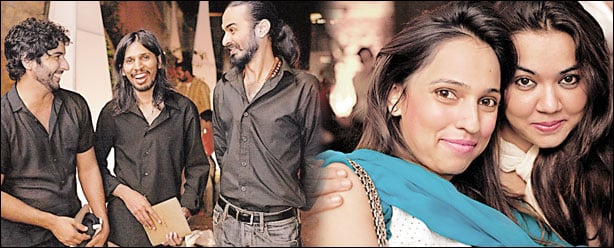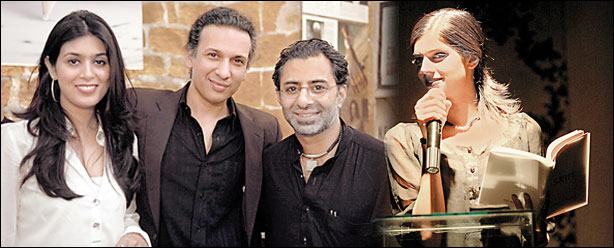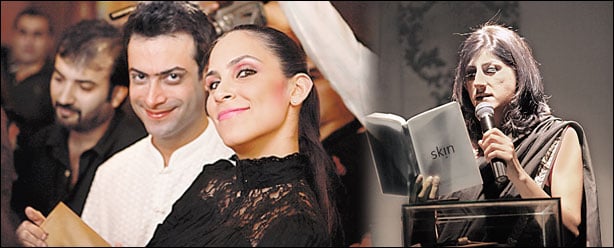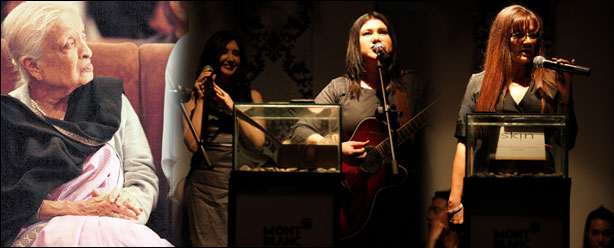|
|
| |
instep
review
Getting under the skin
The launch of Faraz Maqsood Hamidi's book of contemporary
shorts poems – SKIN – certifies that while consumerism
is being threatened by recession, it is the best time to scratch
the surface and look for better alternatives in art and literature.
By Aamna
Haider Isani
|
| |
 |
| |
Each
and every society of the world needs a thread of art, culture or
literature to hold its problems together; the stronger the thread,
the easier it becomes to deal with issues that effect the drudge
of daily life. And while art, literature and culture in the Urdu
medium have always been forcefully strong in Pakistan, their English
counterparts have suffered. Recently, however, one has seen an overturn
of that observation. Authors like Mohammad Hanif, Hanif Qureshi
and Daniyal Moeenuddin have put English prose on the world map and
one hopes to see Faraz Maqsood Hamidi, who recently launched Skin
- his first collection of modern English poems at the Commune in
Karachi - enjoy the same fate.
Because what Hamidi has done with his extremely short, intense and
very pertinent poems is force the modern mindset - a mindset that
has the power to bring about change - to think.
"I really don't know what I'm doing here man," laughed
Pakistan's most well known drummer Gumby, who is best known for
his percussion skills, and would definitely be more comfortable
at a jam session than a poetry recital. But he came, he sat through
the readings with interest and when Imran Aslam took to stage and
led the stream of consciousness away from Karachi's literati to
Swat where literacy for young girls is fast becoming a threatened
privilege and "a war is being waged against the alphabet",
even Gumby made a vital connection.
That evening at the Commune was delightful but bittersweet at the
same time. On one side were faces that one usually frequents at
concerts, fashion shows or equally glamorous dos , all assembled
in the very elegantly designed venue. But on the other side, through
Hamidi's poems and through eyes that observed from beyond the walls
of the Commune, there was a brooding presence of everything unglamorous
and 'real' that envelopes life, actually. The most glaring being
the vast ocean of difference between life within the boundaries
of the Commune that evening and life beyond it in the congested
alley of Miskin Gali that inhabits an overpopulation of immigrants
from all over Pakistan, the Frontier especially. |
| |
 |
| |
However
the entire affair was hardly a frivolous excess, frivolous is something
literature can never be as it is accessible and relevant to everyone
who reads it. That holds true for art as well and the fact that
the Commune, as owner (and designer) Yusouf Bashir Qureshi commented
"is a community space."
"We have been trying very hard to get a grant to have the road
paved," he spoke to Instep. "I am even willing to pay
for it myself but this has become no-man's land and it is impossible
to get anything across to the government. But as the name suggests,
this is community space and our strongest interaction is with the
community that lives here. We organize art workshops for the children
of this area and whenever an exhibit is to open they are invited
to view it first. Some of them have become our most interesting
critics because they come up with strong opinions on what they like
and what they dislike. We are very clear that whatever happens here
is work related and there are never any parties or events that would
defy the purpose of this alternative space." |
| |
 |
| |
It
certainly was a purpose that brought the odd hundred plus people
there: Omran Shafique (Mauj), Bilal Maqsood (Strings) and music
video director Sohail Javed. From the world of fashion came designers
Kamiar Rokni and Nida Azwar (who was also stationed behind the book
sale counter), Bunto Kazmi and model Nadia Hussain. And amongst
the more literarily appreciated were poetess Zehra Nigar, Fatima
Suraiya Bajia, and Zeba Bakhtiar. There were many others of course,
especially those who were reciting that evening. Doing the honors
were Frieha Altaf, Leon Menezes, Naad-e-Ali Naqvi, Sanam Saeed,
Shazim Ashraf, Tanya Shafi, Zeb and Haniya, Imran Aslam and the
poet Faraz Maqsood Hamidi himself.
The launch of Hamidi's debut collection SKIN also marked the second
release by Still Waters, a publishing house started by Kiran Aman
and Khadija Malik Hassan two years ago. It was the luxurious coffee
table book titled Revived: The Journey Within that featured prominent
women from the fashion industry that marked their debut and true
to promise, the girls returned with another, even more poignant
publication this time around. |
| |
 |
| |
|
Speaking about the poet and the book, Kiran and
Khadija spoke: ""Faraz Maqsood Hamidi has a distinctive
poetic voice even as he humbly shuns the label of 'poet'. SKIN is
a collection of English verse that at once belongs to and creates
a contemporary Pakistani idiom. While Hamidi's themes evoke the
universal human condition, his poems speak to the here and now of
the new Pakistani experience."
Likewise, the evening was all about bringing about changing and
about making art and literature accessible to facilitate that change.
Kiran and Khadija announced the beginning of Still Waters Purpose,
a chapter that would publish affordable editions of all the titles
they published. They also announced the launch of Still Waters Productions,
kicking off with a musical rendition of Hamidi's poetry titled Prelude
to Skin in collaboration with Hamidi himself and Aly Rana. It would
be available on a CD featuring the vocals of Naad-e-Ali Zaidi and
Tanya Shafi. Watching Tanya go from being prominent fashion model
to vocalist indeed is change and how!
SKIN will be available for a retail price of Rs
1,000 in Karachi, Lahore and Dubai.
Event
designed and managed by Wow Factor.
Photography: Kohi Marri for Lotus PR
|
| |
|

